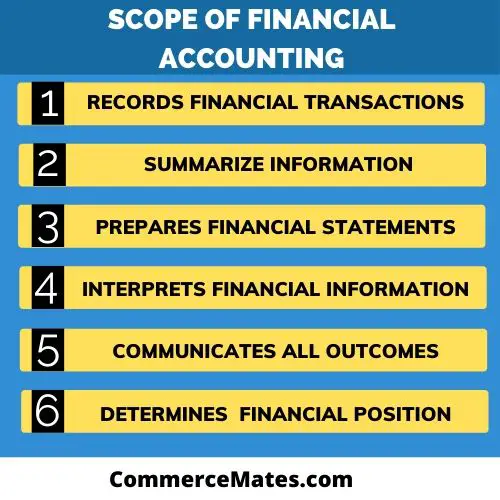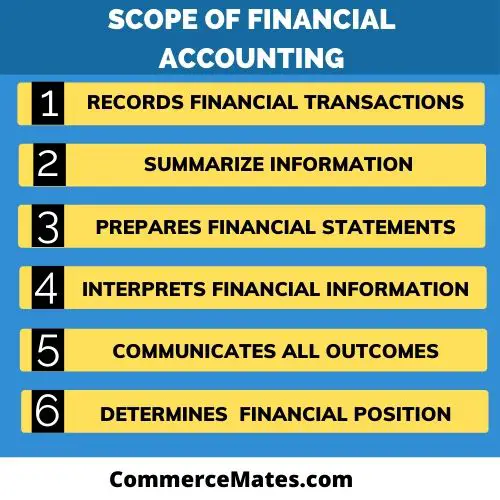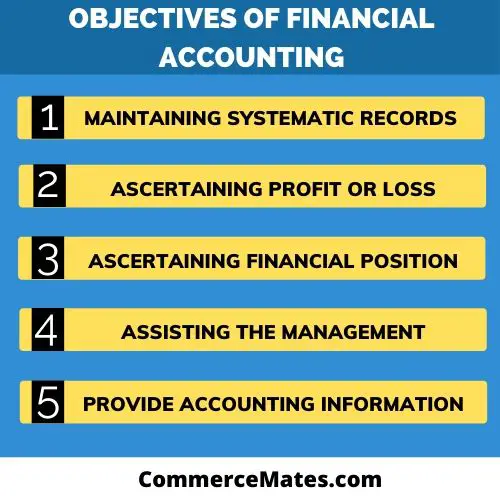Contents
Meaning of Financial Accounting
Financial accounting is a branch of accounting which records each financial information and analyse it to determine the financial position of a business. It is a process of recording, summarising, analysing and presentation of all financial transactions of a business in the form of financial statements. Financial accounting involves the preparation of various financial statements like income statement, cash flow statement, balance sheet etc. using accounting principles.
These financial statements are prepared on a routine basis by companies and presented to all its stakeholders. Financial accounting aims at delivering the fair and accurate image of financial affairs of business to all its stakeholders. It is done in accordance with rules provided by GAAP or IFRS. It is an important tool for management in their decision making as they depend on financial reports for decision making and forecasting purposes.
Financial statements prepared by financial accounting takes into account the following aspects of business viz. Expenses, Revenue, Asset, Equity and Liability. Financial accounting has an important role in increasing profitability and efficiency as it helps in managing all financial resources of the business. It is statutory required to practice financial accounting in their operations by every business organisation. Scope of Financial Accounting is described as given below:
Scope of Financial Accounting

Records Financial Transactions
Financial accounting record each and every financial transaction taking place in the business organisation. It maintains a clear and systematic record of all information in the form of journals and various subsidiary books. It avoids any confusion or loss because if any problem arises these records can be easily checked. All transaction cannot be just memorized by humans without recording them and that makes the financial accounting important part of every business.
Classify and Summarize Information
Information collected and recorded by financial accounting is properly categorized according to their nature. Financial accounting involves classifying and summarizing all financial information recorded at the initial step. All transactions of similar nature are grouped together under one head by making accounts like Sales, Purchase, Rent, Salaries, Interest etc. Grouping of same nature transactions together adds convenience in understanding of information collected.
Prepares Financial Statements
Financial accounting prepares financial statements like cash flow statement, income statement, balance sheet etc. These financial statements depict the true financial position of business. Financial statements are the result of various information collected and analysed in overall process of financial accounting. All financial strength and weakness of business are determined by preparation of financial statements.
Interprets Financial Information
Financial accounting interprets information from several analysis conducted and financial statements prepared. It understands and explains the results of several relationships establishes by analysis to different users for easy understanding and decision making. It simplifies the accounting information so that it is well understood by persons having limited or no knowledge of accounting subject.
Communicates All Outcomes
Financial accounting serves the needs of all external stakeholders by delivering them true and accurate picture of the company’s financial affairs. It communicates them all financial information by providing them with financial reports routinely. All interested parties to business are fully aware of all business financial matters and this helps them in making conclusions. It helps them in knowing profitability and future growth aspects through these reports.
Determines and Maintains Financial Position
Financial accounting determines fair and actual image of financial position of business. Finance is termed as lifeline of business activities and its management is quite important for every organisation. Mismanagement of financial resources may have adverse effects on the company’s performance. Financial accounting records and analyse each financial aspect of business.
It delivers all information to internal management team from time to time for their decision making. Management are able to take all necessary steps whenever required related to financial resources which will improve the overall productivity. This all helps in maintaining a proper financial position for every business.

Nature of Financial Accounting
Accounting is first step
Accounting is start when a financial transection take place. It records the financial transection after that communicates this information to its users. then the user this information for their decision making.
Accounting is an art and science:
Accounting is an Art and Science as well. Accounting is an art of recording, classifying and summarizing of financial transactions. Accounting is science as well as it requires certain principles (accounting principle).
Accounting is a process
Accounting is a process recording of financial transaction, summarizing, analyzing, and reporting to the user of accounting information.

Accounting deals with financial transactions only
financial accounting is considering only monetary transactions. It does not take into account various non-financial aspects such as market competition, economic conditions, government rules, and regulations, etc.
Historic In Nature
Financial accounting considers only those transactions which are of historic nature. day-to-day activities transactions are recorded and the information is provided after a period of time. All financial decisions of the future are taken on the basis of this past information
Records Actual Cost
Financial accounting records the actual cost of the transaction and does not consider the price fluctuations taking place from time to time. It records the historical cost or the actual cost of the assets or liability.
Objectives of Financial Accounting

Maintaining Systematic Records Of Transactions
The objective of Financial accounting is to Systematic record the financial transactions of an organization in the books of account. Records are in chronological order or date and time wise. It can use in the future when we require it for further process.
Ascertaining Profit Or Loss
To ascertain whether the organization have earned profit or incurred loss an Income statement or Trading and profit & loss account is prepared. The income statement gives the data of profit and loss of a financial year. The balance sheet gives the overall position of the organization.
Ascertaining Financial Position
Another objective of Accounting is to ascertain the financial position by preparing the Balance sheet. The balance sheet contains assets and liability that give information about the financial position of the organization.
Assisting The Management
Financial accounting Provides financial information to management for decision making. The information includes the debtors and creditor, profit & loss and other information.
Provide Accounting Information To Users
Financial Accounting provides the required information to interested users Who analyze them as per their requirement. Users can be internal or external. Internal users are the management, employees, and external user are creditors, tax authorities, investors, etc.